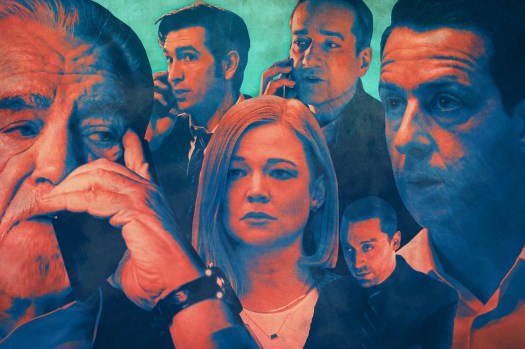
Tony Soprano, Walter White, Iago–Satan himself–and now the Roy Family. Stories about devilish characters and reprehensible behavior always seem so hard to resist. HBO’s Succession is the latest version of a cringe-worthy but binge-worthy show, full of wealthy rogues backstabbing each other as they scramble to the top of a multimedia empire. I’m embarrassed to love it. Why is such villainy fascinating?
Lifestyles of the Spoon-Fed and Conniving
Succession debuted as a drama in 2019, sliding in under the radar between the ignominious end of Game of Thrones and the rise of The Crown. It won a slew of Emmys, though I’d never heard of it when I was flipping channels at my brother’s house last month on vacation, when I had extra time on my hands. The story circles around 83-year-old Logan Roy (Brian Cox), head of the Waystar media conglomerate, who ought to be aging out of his role and passing the torch on to one of his children. But he refuses to go, even though the shareholders clamor for a succession plan and he experiences episodes of physical and mental frailty. Logan is vicious, duplicitous, domineering, and as vulgar as a recent ex-President, full of quips like: “Would you like to hear my favorite passage from Shakespeare? Take the fucking money.”
Logan’s favorite word is money, but his second favorite word is family, which is the problem. He’s one of those people who constantly espouses family values while in the next breath belittling, snarling, and smacking down–literally–his adult children. He’s raised them in his image, so none of them has the right combination of intelligence, courage, or work ethic (never mind integrity) to run an $18 billion dollar enterprise. Waystar is a unique entity: think Fox plus Disney, Republican-leaning jingoistic news combined with theme parks and cruises. Someone has even created a real twitter account for the fake theme park with bizarre but hilarious tweets:

This is the kind of show that can get its hooks into you from minute one, as soon you see likely successor Kendall Roy (Jeremy Strong) trying to pump himself up in a bathroom mirror before an important meeting, only to nearly fumble the acquisition of an internet company and end up paying too much. Yet none of his siblings seem capable either. Not wisecracking Roman (Kieran Caulkin) who can’t sit still long enough to read a document. Not the lone brilliant but conniving daughter Shiv (Sarah Snook), whose eyes dart around the room as if looking for escape but more likely working an angle. Not her oily hanger-on of a fiance, Tom (Matthew Macfayden). Definitely not the eldest son, Connor (Alan Ruck), the granola-and-champagne philosopher whose primary contribution to the greater good is through tax cuts for the wealthy. By the time the gawky beanpole Cousin Greg (Nicholas Braun) shows up, even after he loses his liquid lunch through the eye holes of a theme park mascot, you’re still hoping maybe his hapless naivete will bring a breath of fresh air to the party. But once he’s directed to start illegally shredding documents for Tom, you know there will be no hope there. Which is kind of the point. It’s an idea John Milton perfected, four centuries ago. No Hope=Can’t Stop Watching.

Abandon All Hope, But Tune In for Our Next Episode
Milton wrote the 1667 classic, Paradise Lost, to bring life to the story of the Garden of Eden at a time when much of art still centered on Bible stories. Yet, Lucifer ended up the star of the show, a complex character with a fully-fleshed back story. The epic poem was supposed to be a morality tale about the fallen angel, cast out of heaven for his pride, who tries to corrupt God’s new creations (humans) and ends up powerless, a mute serpent. Yet the poem offers fascinating details about Hell: the names of the devils, their hierarchy, even the games they play. Satan is the protagonist (even Milton said as much), and because the story is his story (not Adam’s, Eve’s or God’s), his character has the poetic vitality that the angels lack. The characterization has launched many an English professor’s career, and debates rage on as to whether call Lucifer/Satan an antihero, a tragic figure, or even an honorary American, according to one analyst: “The essential American soul is hard, isolate, stoic, and a killer. It has never yet melted.”
As the stories from 1667 forward has shown, the antihero’s story is often just more interesting. Think of how Superman is two-dimensional compared to Ironman, whose daring deeds are repeated suicide attempts, trying to atone for his weapons-manufacturing past. The Grinch learns to have a heart, Scrooge resolves to end his greed, Jean Valjean, Darth Vader, Snape… there are tons of well-known uplifting stories of villains who become heroes through redemption.
However, plenty of other compelling villains don’t seek redemption. Iago isn’t the protagonist in Othello; he just has all the best lines. Walter White struggles with his conscience, but justifies murder and drug dealing by telling himself he needs to leave a legacy. (Once he growls, “I am the danger,” the redemption part flies out the window.) We know Tony Soprano’s mind is troubled, because the show is about a Mafioso seeing a therapist. But just when Tony’s humanity starts to sprout little green shoots, next thing you know he’s chopping up bodies in a bathtub. The Sopranos ran on that energy for six years, without redemption for its main characters. Part of viewer anger at the writers for the series ending (Wait, What happened next?) is that their villainy was unresolved and unredeemed.

No Redemption Here
Thus, redemption is not the simple key to unlock a fascination with villainy. The possibility of redemption, held out as a carrot to the viewer, might be part of the underlying energy. In Succession, each person carries their own unique brand of turpitude, and each succumbs whenever they seem to near a positive step forward. Just when Kendall seems to be working up enough strength to step out of Dad’s shadow, his cocaine demons pull him back. When Roman finally takes in interest in doing actual work after being appointed Chief Operating Officer, he blows up his own project (literally) by pressuring the workforce to cut corners to impress Dad. Shiv–might a brilliant and liberal woman finally get the family out of this entire mess? Nope. She talks the talk, but then can’t resist taking Cousin Greg’s last dollar. Even Holly Hunter, in a guest-starring role as genteel as Logan is vulgar, turns out to be a bigger backstabber than all the rest. Perhaps a key element to the fascination is the tease that someone might be redeemable but never is.

The Pratfalls of the Spoon Fed
Plus, there’s the Lifestyles of the Rich and Famous Schadenfreude. In the ’80s, there was a series of nighttime soaps full of similar villains–Larry Hagman, Joan Collins, and the like Part of the fascination with those shows was the lifestyle part, and that is prominent in Succession. The outlandish furs and jewels, everyone imbibing champagne like water, never-ending parties–the Roys have a lot in common with the Ewings and the Carringtons. But times have changed and nowadays, one-percenter behavior stirs less fascination than anger. Hence, the wealthy here are smothered in satire. The Roys use their money as a sledgehammer rather than a magic wand, like when Logan, angry at a family gathering, snarls at the cooks to throw out all the lobster and shrimp and just get some pizza. It’s 2021, so we get to see the caterers scraping the seafood into the trash, and it’s a gut punch harder than anything we feel for the characters.
If we find the lifestyle interesting–the private jet, the multi-story yacht, the family castle–what’s even more interesting is when these spoiled little rich kids do have to face the music. Perhaps that’s the secret? If most of your characters are despicable, then you’re happy when they take a pratfall. Works every time, keeping the naughtiness in check. Schadenfreude, like slipping on a banana peel, doesn’t get old.

Lucifer in Love? Bo-o-o-o-ring
It’s interesting to compare this show with another recent effort, Lucifer, which initally tried to pick up where Milton left off. Fallen angel Lucifer Morningstar, brilliantly depicted as happy-go-lucky-but-depraved by Tom Ellis, comes to earth after tiring of being King of Hell. He sets up a nightclub stuffed with drug dealers and prostitutes, many of whom are demon pals of his, mingling with and corrupting souls for later damnation. The show worked as a weird kind of detective police procedural, as long as Lucifer remained comfortably amoral.
However, in its last few seasons (and possibly because the writers didn’t know if or how long the show would be renewed), the characters were neutered and suffered for it. Lucifer fell truly in love with his detective partner, Chloe, whose insipid nasal whine was the stuff of nails-on-blackboard. By the time the two go off into the sunset somewhere…was it Earth? Hell? the Silver City? wherever God and Lilith went?… I lost track and interest. Worst of all, the luscious demon Mazikeen also rode off with Eve, leaving her curved fingernails and knives behind–true love was just plain boring. I do like a good romance, but not when it turns the strong-willed into the weak-kneed.
I, for one, hope that Succession doesn’t fall prey to that kind of redemption. I don’t know if a show filled entirely with unredeemable scoundrels can sustain more than four seasons–the producers have promised no more than five–but I’m willing to test it out. Please, please, please just don’t let them start falling in love or doing the right thing.
That will take all the fun out of it.
